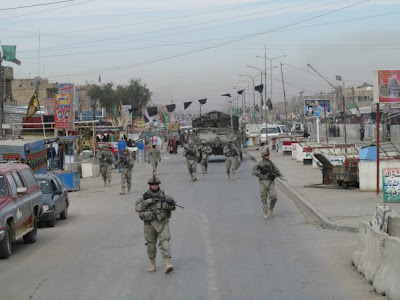
Evening...
A late start tonight...but I think you would agree my priorities are spot on - I had a wonderful dinner and night out with my lovely bride...
Before we get to tonight's focus, I would encourage you to take a look back at my blog Counting to Ten and the comments that have been posted. I am always interested to hear what you think as we continue on this journey. The comments on the Rolling Stone article The Myth of the Surge, are quite insightful...don't you think? Have you read the article? If so, share your views...
Also, thanks to a tipper from Ms. Marti, I added SPC Kevin Mowl to our Fallen Angel Wall on the blog. SPC Mowl, 22, of Pittsford, N.Y., was injured by an IED attack in Baghdad last August and was receiving treatment for his injuries at Bethesda. He passed away on 25 February 2008 after a long journey down the road of recovery. He was assigned to the 2nd Battalion, 3rd Infantry Regiment, 3rd Brigade, 2nd Infantry Division (SBCT) based at Ft. Lewis, WA.
To the family and loved ones of SPC Mowl, we will remember his courage and sacrifice...
Tonight's focus...
3rd Squadron, 2nd Stryker Cavalry Regiment is featured in a blog by the Baghdad Bureau, New York Times. There are a series of photos below and a video that shows the 3-2 SCR finding a bomb factory in Diyala, Iraq. The 3-2 has been in some nasty engagements during their time in Iraq...talk about combat seasoned warriors...
As a heads-up...towards the end of the video, LTC Coffey, Commander, 3-2 SCR, talks about the loss of six of his men on 9 January 2008 in Sinsil, Iraq. This part of the video may be tough to watch for some as it shows the deadly results from that horrible day in January.
“Inshallah,” came the villagers’ reply, an Arabic expression meaning “God willing.”
Their wariness was understandable. The Americans had arrived in the northern Diyala River Valley in force in mid-January, during the opening phase of an operation to clear Al Qaeda in Mesopotamia from one of its local strongholds in Diyala Province.
Iraqi villagers had seen government forces arrive before, only to have their areas slide back under insurgent control when they left.
This time is different, the Americans are insisting.
“Our biggest message is that we are coming in with the Iraqi Army, with the Iraqi Police, and we are staying and providing security, and that’s something they haven’t seen before. But until they see it they are not going to believe it,” said Maj. Gen. Mark P. Hertling, the American commander in northern Iraq, as he toured villages early in the deployment.
Only seven months earlier, Americans had stormed into Baquba, the capital of Diyala Province. They secured and held the city, but allowed some insurgents to escape into the surrounding countryside, where they continued to torture, kidnap and murder.
Bashar, a college teacher who moved to Baghdad a year ago to escape the clashes, said that the American-financed groups of Sunni men who now help secure Baquba rarely trouble her or other civilians during her weekly visits home.
However, she said, people do suspect these former Sunni insurgents of carrying out revenge attacks on Shiite militias, who inevitably retaliate. And outside the city she feels much less safe.
“There is terrorism still there, even now,” she said. “The general situation in Baquba is good, but the borders of Diyala are not safe.”
After the first few hours of the latest operation in the northern Diyala River Valley, which lies a few miles north of Baquba, most of the leaders of Al Qaeda in Mesopotamia had, once again, escaped.
But American officers argue that their presence, reinforced by Iraqi Army units, will now deprive the extremists of a crucial base. Pointing to a 75 percent fall in attacks from June 2007 to January 2008 across Diyala as a whole, and 85 percent within Baquba over the same period, they say the insurgents will now be further crippled by the loss of a safe haven to manufacture car bombs to send into nearby Baghdad.
“The real victory here is not killing 10, 20 or 30 insurgents; it is that this population here is separated from them,” said Colonel Coffey, commander of the Third Squadron, Second Stryker Cavalry Regiment, part of the Fourth Stryker Brigade Combat Team.
“The Iraqi provincial government is able to operate in here again. That is the real permanent win.” It has been a win with costs.
Moving through the villages, American forces have found evidence of Al Qaeda in Mesopotamia’s weapons factories, training camps and weapons caches.
They also lost six American soldiers and an Iraqi interpreter in a single explosion, at the start of their mission here. It happened Jan. 9, after their patrol walked into a house rigged to blow up in the village of Sinsil.
The compound had been cleared of explosives two weeks earlier, commanders said. But villagers did not tell them that insurgents had sneaked back in and booby-trapped it again.
--------------------------
I love you Chris...be encouraged and stay with it son. We are praying for you and the entire 2nd SCR.
Be safe!
v/r,
- Collabman
























































